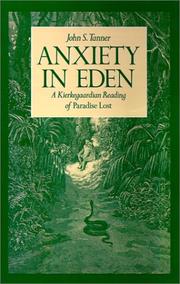| Listing 1 - 10 of 43 | << page >> |
Sort by
|
Book
ISBN: 1280486422 9786613581402 1443838284 9781443838283 9781443837507 1443837504 9781280486425 6613581402 Year: 2012 Publisher: Newcastle upon Tyne Cambridge Scholars Publishing
Abstract | Keywords | Export | Availability | Bookmark
 Loading...
Loading...Choose an application
- Reference Manager
- EndNote
- RefWorks (Direct export to RefWorks)
Paradoxically, if nature has always been a source of fear, civilisation - its other and at the same time the epitome of progress and order - has not only doubled fear itself, but also added its new sister, anxiety. In effect, the notions of civilisation, fear and anxiety can hardly be separated. Fear - either linked Other anxiety or distinct from it - lies at the foundation of civilisation, which as much promises to shelter us from these afflictions as it does proliferate them. Confronted no l...
Book
Abstract | Keywords | Export | Availability | Bookmark
 Loading...
Loading...Choose an application
- Reference Manager
- EndNote
- RefWorks (Direct export to RefWorks)
Book
ISBN: 9783846765746 9783770565740 Year: 2021 Publisher: Paderborn : Brill | Fink
Abstract | Keywords | Export | Availability | Bookmark
 Loading...
Loading...Choose an application
- Reference Manager
- EndNote
- RefWorks (Direct export to RefWorks)
Kleist has fascinated readers like no other German writer. How did a one-time soldier with an unremarkable literary education become one of the greatest innovators of German literature? What allows for the tragedy of his life? In what ways does his work speak to us today? In his great biography Günter Blamberger gives us a new Kleist: Unlike conventional approaches, he does not try to understand Kleist's life from the perspective of its end-from the perspective of his suicide as the final catastrophe of a life in permanent crisis. Rather, he remains at eye-level with Kleist's present, narrating from the perspective of Kleist's experience-in the moment with him-capturing the unsettling or the astonishing in each phase of his life, the explosive nature of each one of his risky experiments in living and writing. The result is an indispensable work of German literary history-a vivid, captivating biography of one of the greatest literary geniuses of all time.
Book
Year: 2004 Publisher: Washington (D.C.): Heldref publications,
Abstract | Keywords | Export | Availability | Bookmark
 Loading...
Loading...Choose an application
- Reference Manager
- EndNote
- RefWorks (Direct export to RefWorks)
Book
ISBN: 9783825357184 Year: 2010 Publisher: Heidelberg Universitätsverlag Winter
Abstract | Keywords | Export | Availability | Bookmark
 Loading...
Loading...Choose an application
- Reference Manager
- EndNote
- RefWorks (Direct export to RefWorks)
Anxiety in literature --- Italian literature --- History and criticism
Book
ISBN: 9780472123506 9780472130665 Year: 2018 Publisher: Ann Arbor University of Michigan Press
Abstract | Keywords | Export | Availability | Bookmark
 Loading...
Loading...Choose an application
- Reference Manager
- EndNote
- RefWorks (Direct export to RefWorks)
Writing during the reign of emperors Trajan and Hadrian, Juvenal drew on Roman legend and the history of preceding imperial dynasties as a means of scrutinizing cultural upheavals in the Rome of his day. Tacky foreigners, the nouveaux riches, women who don't know their place, bloodthirsty--even crazy--emperors and their (often worse) wives confront the reader at every turn, along with bad poets, corrupt aristocrats, gladiators, whores, false philosophers, sad-sack men in the street, and slaves. Juvenal's poetry set the tone, and often the topics, for satirists throughout the centuries of European literature. In his sixteen verse satires, Juvenal presents speakers who decry the breakdown in traditional Roman values and the status of Roman men as they are confronted by upstart foreigners, devious and deviant women, class traitors, the power of the imperial household, and even the body itself. The satirist castigates vice and immorality even as he revels in describing them. This book locates Juvenal's targets among the matrices of birth, wealth, class, gender, and ethnicity and walks carefully through a number of his most arresting vignettes in order to show not only what, but how, he satirizes. Moreover, the analysis shows that Juvenal's portraits sometimes escape his grasp, and, as often as not, he ends up undermining the voice with which he speaks and the values he claims to hold dear. Individual chapters look at the satirist himself, rebellious bodies, disgraced aristocrats, uppity (even murderous) wives, and the necessary but corrupting power of money. The conclusion considers the endurance of both the targets and the rhetoric behind them in the modern world. Making Men Ridiculous will interest scholars and advanced students of ancient satire, later European satire, imperial Roman culture and literature, and class, gender, and sexuality in the ancient world.
Masculinity in literature --- Anxiety in literature --- Juvenal --- Criticism and interpretation.

ISBN: 0195072049 Year: 1992 Publisher: New York (N.Y.): Oxford university press
Abstract | Keywords | Export | Availability | Bookmark
 Loading...
Loading...Choose an application
- Reference Manager
- EndNote
- RefWorks (Direct export to RefWorks)
Anxiety in literature --- Sin in literature --- Kierkegaard, Soren, --- Milton, John,

ISBN: 0814290353 Year: 2004 Publisher: Columbus Ohio State University Press
Abstract | Keywords | Export | Availability | Bookmark
 Loading...
Loading...Choose an application
- Reference Manager
- EndNote
- RefWorks (Direct export to RefWorks)
Book
ISBN: 9789042031135 Year: 2010 Volume: 141 Publisher: Amsterdam New York Rodopi
Abstract | Keywords | Export | Availability | Bookmark
 Loading...
Loading...Choose an application
- Reference Manager
- EndNote
- RefWorks (Direct export to RefWorks)
Aesthetics, German. --- Anxiety in literature. --- Anxiety --- German literature --- Uncanny, The (Psychoanalysis) --- Themes, motives. --- Uncanny, The (Psychoanalysis).
Book
ISBN: 1474423884 1474423876 Year: 2020 Publisher: Edinburgh : Edinburgh University Press,
Abstract | Keywords | Export | Availability | Bookmark
 Loading...
Loading...Choose an application
- Reference Manager
- EndNote
- RefWorks (Direct export to RefWorks)
Focusing on a complex and contentious period that was formative in shaping American society and culture in the twentieth century, this book sheds new light on the ways in which fiction engaged with contemporary notions of masculinity.
| Listing 1 - 10 of 43 | << page >> |
Sort by
|

 Search
Search Feedback
Feedback About UniCat
About UniCat  Help
Help News
News